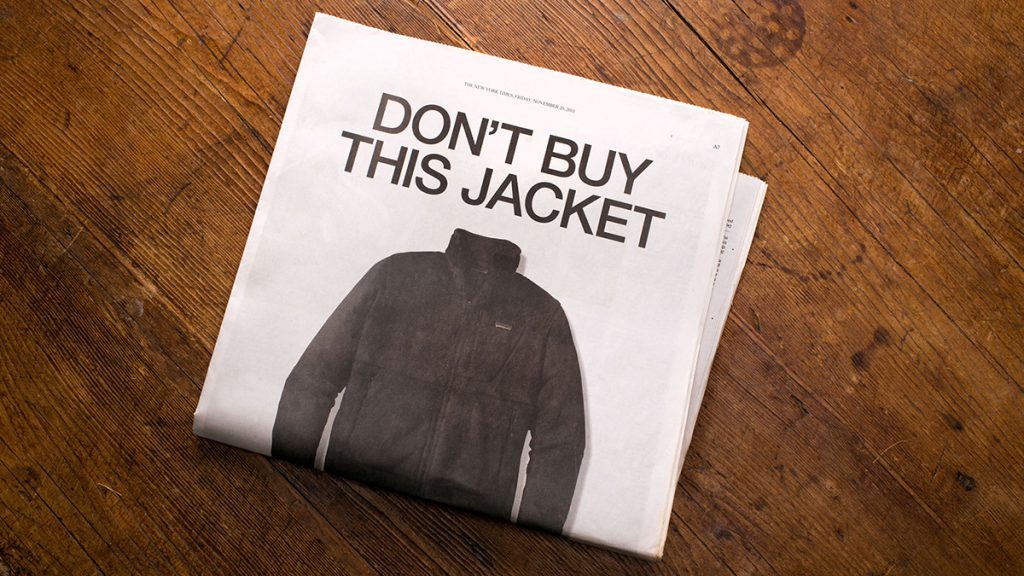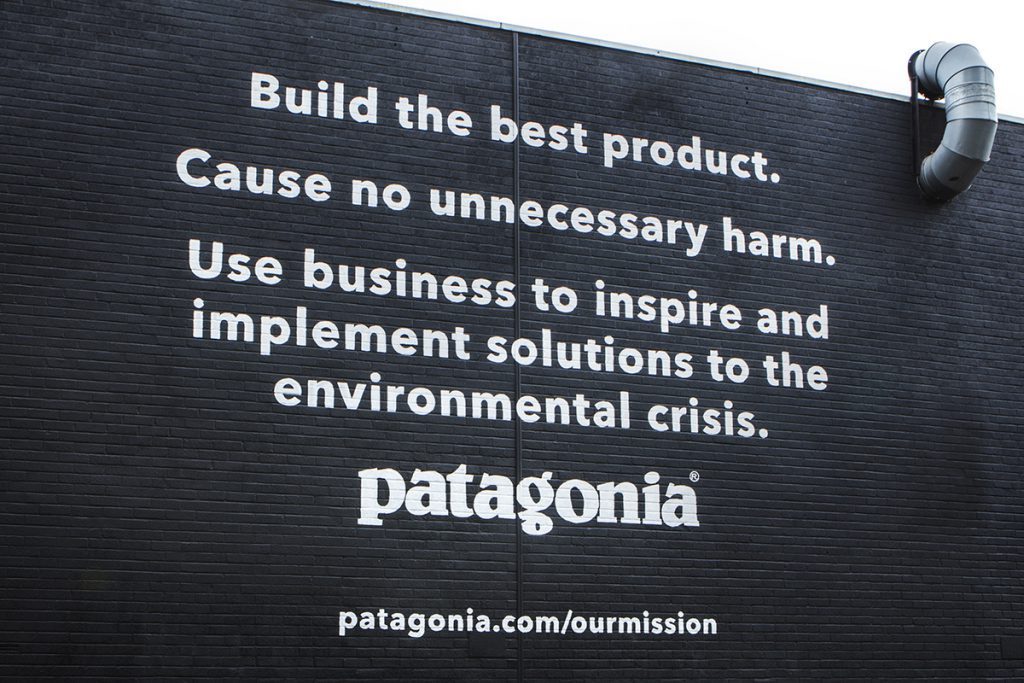
Patagonia, American company specialized in tourist gear production (mostly clothing) is an example of a brand which follows the “doing well by doing good” principle – content marketing social activism. The idea is to give a good example to business by carrying out actions which contribute to a positive change in the world. Brand-activist’s message refers to the times we live in. In response to the problems served each day by the media, it creates content abounding in an antidote that we need so much. For instance, in the times of an escalating social division and conflict, it promotes union, so desired by people.
Patagonia’s goal is to fix another burning issue of the current world – excessive consumerism and the devastating effect it has on the planet. The environmental cost of everything we do is astounding – they tell to their customers.
What means do they use?
According to business standards, the practices used by Patagonia are often unconventional. Since 1985 the company has made a pledge to devote 1% of its annual sales to natural environment protection goals. It decided to hand over its entire 10 million income generated on Black Friday to bottom-up eco organizations. It encourages customers to reuse and recycle clothes instead of dumping them. It offers free service care fixing used clothing and gear, which went on a tournée #WornWear in a camper nicknamed Delia. The brand also opened a so called thrift shop selling second-hand products.
But the most recognizable example of what makes Patagonia trip marketers up was a page in the “New York Times” showing their best selling R2 jacket with the immortal headline: “Don’t buy this jacket.”

“The real message behind ‘Don’t buy this jacket’ – and it is still Patagonia’s topical message when it comes to use – is: Don’t buy this jacket, if you don’t need it,” explains Alex Weller, brand marketing director Europe. “And if you do need it, make sure you’re buying something that was carefully manufactured, can be repaired and has a clear goal. It’s not about encouraging people to give up buying things; it’s about changing the relation of man with things.
Contrary to many other clothing brands, Patagonia offers clothes that are exceptionally durable and solid. So whenever they cry out loud in the campaign: “Think twice before you buy our product” – the overtone is always the same: “but don’t even think about buying anything else.”
The attention drawn by the campaign allowed Patagonia to increase its sales in 2012 considerably. For company representatives the equation including the business goal and the environmental goal is simple: the higher the income the more it can do for the planet.
The vivid black-and-white design and the anti-consumerism slogan “Don’t buy this jacket” has become an advertising icon and has defined the style of communication for the brand in the future.
With few exceptions, the company usually resigns from traditional campaigns. “We usually prefer to use longer forms of communication through our own channels and the experiences that we create or through cooperation with the media and partners, who help us to tell our story. The role played by advertising simply does not fit this goal,” Weller adds.
An example? In 2011 Patagonia launched The Common Threads Initiative – partnership program for customers, encouraging them to become brand ambassadors and not to buy things they don’t need, to buy products that will last long, to repair things that broke down, to reuse or sell things they no longer need and finally – to recycle worn-out things. “We are the first company to have asked customers to make a formal pledge and to take on the role of partners in an attempt to decrease the use and to keep products away from the rubbish dump or incineration plant,” says Yvon Chouinard, Patagonia founder.
The relation of the brand with advertising agencies is also far from typical. Patagonia’s deeply rooted philosophy means the company has quite a good idea of what they are looking for, even before sending a brief. For the agency this means more moderation in designing than with other clients.
Before Julian Harriman-Dickinson, creative director of a London-based studio, knocked on the door of local companies asking for a permission to paint the walls of their buildings into an inscription preaching the mission of Patagonia, he asked the brand representatives: Is this message genuine and can we back it up? And then: How can we communicate it to make it meaningful to our audience? He admitted that Patagonia’s message didn’t seem fake because the goal was one of the company’s foundations from the very start, it did not come up as a result of marketing and more progressive customers.
In November 2016 on some of the walls of buildings across UK there appeared huge black-and-white murals saying: “Build the best product. Cause no unnecessary harm. Use business to inspire and implement solutions to the environmental crisis.” Just like in the case of “Don’t buy this jacket,” the design was also very simple and minimalistic. In addition, the brand organized a series of accompanying events: workshops, debates and film shows.

Rick Ridgeway, Patagonia’s vice president of environmental affairs, admits that the company’s attitude has been inspired by a story he once read in the Times. It was about how consumers were spending money in the last few days before the Great Recession. It turned out the financial limitations created a very valuable trend (and it wasn’t just about hunting bargains). Impulsive purchasing and ostentatious consumption slowed down and some consumers started to look for products that offer lasting value, such as vehicles with better fuel economy and gardening tools for growing your own food. “This is the kind of product we are trying to deliver to our customers,” Ridgeway said. “I thought: wow, if there are at least a few people who think this way, these are “our people.” And I started to wonder how to carry out our tasks better to offer them what they need responsibly. Not only during a recession but always.”
Kategorie: power of contentic, B2C